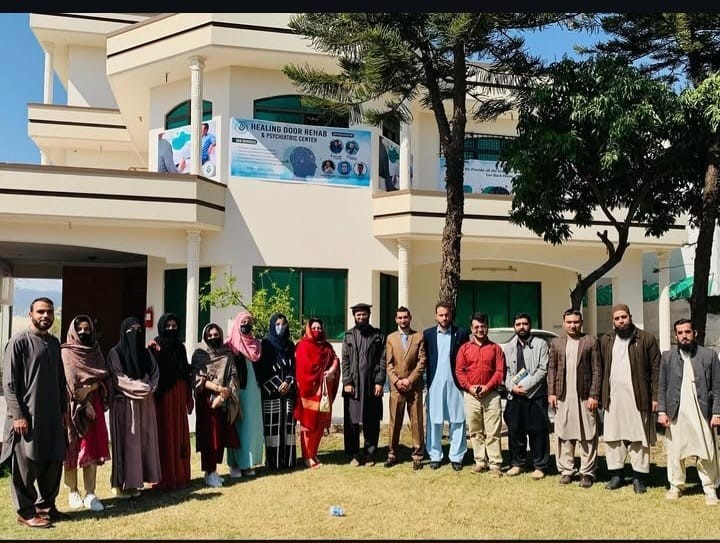Islamabad 2025 Spotlight: Leading Psychiatrists Shaping Mental Healthcare & Innovative Therapies
Islamabad, a peaceful city in Pakistan, is fast becoming a beacon of progressive mental healthcare in 2025. With community programs training GPs to identify and treat mental illness, initiatives like the Humraaz mental‑health app, and innovative methods discussed at the 24th International Psychiatric Conference, the city now offers access to the best psychiatrist in Islamabad.
This powerful combination of tech-driven tools, policy backing, and trained professionals is transforming Islamabad’s mental-wellbeing landscape—and positioning it as a leader in compassionate, high-quality psychiatric care with the best psychiatrist in Islamabad at its core.
The Evolving Landscape of Mental Health in Islamabad
In Pakistan mental health awareness has immensely increased which has augmented the need of specialized care. The city of Islamabad, which is increasingly being populated, with the reach of various kinds of medical specialization, is on the forefront of this transition. There is an increasing demand by patients to be treated in an evidence-based way and offered a holistic view of their lives. This has necessitated the development of the conventional methods of psychiatry in addition to novel methods of therapy. Mental health stigmatization, the limited resources, and impeded access, especially in the rural setting, are actively tackled by a number of initiatives and institutions in the capital city.
Leading Psychiatrists: Pillars of Care
The core of this change is seen in the best psychiatrist in Islamabad, who are not only well-qualified, but also extremely devout in regard to patient care and further development of the field. Reputation has been earned by these practitioners because of their massive experience, adoption of new practices and humane ways. They are applicable in diagnosis and treatment of numerous mental illnesses such as what appear to be simple conditions such as anxiety and depression to mention, as well as more serious conditions. They also take part in lending a voice in the mental health policy and the enlightenment of people. As they shop around to get the best psychiatrist in Islamabad, they tend to seek one who is associated with an established organisation and who has a record of achievement of positive results.
Innovative Therapies: A New Horizon
The scene of mental health in Islamabad is undergoing progressive approaches of therapies that are far beyond the medicines and counseling sessions. Interventional psychiatry is one of the more outstanding ones, and it involves advanced solutions such as ECT and neuromodulation, particularly ketamine infusions, to those with treatment-resistant depression. A study in Fauji Foundation Hospital at Rawalpindi reveals the beneficial quick antidepressant action of Ketamine in hours to weeks. In tandem with this, are integrated care models which involve medical control and therapy, arts, yoga and mindfulness to address the entire person and not just the symptoms as seen with Healing Door ICE approach. Standing at the forefront of innovation, Pakistan-based research is interested in psychedelic-aided therapy, such as MDMA and psilocybin in the context of PTSD and anxiety, as it is rapidly popular around the globe since it is a fairly new direction of treatment. The combination of these new and evidence based practices is widening the existing mental health care arsenal in Islamabad and providing more specialized, effective, and rapid-acting recovery options than ever before.
Cognitive Behavioral Therapy (CBT) with Cultural Adaptation
The current practice of mental health workers in Islamabad is the increased usage of culturally-adapted Cognitive Behavioral Therapy (CaCBT) to make it more relevant and effective to Pakistani people. CaCBT has also engaged in combating the peculiarities of the therapeutic process that emerged due to incorporating the local cultural beliefs, religious values, and social norms into the course of treatment. This practice does not only enhance the engagement of patients but also results in the improved outcomes of treatment. Researches have indicated that CaCBT produces steep improvement on symptoms of depression, anxiety and social phobia as also improved self-esteem in youth and adults in Pakistan.
Transcranial Magnetic Stimulation (TMS)
The Transcranial Magnetic Stimulation (TMS) is a treatment procedure that touches the brain yet non-medically. It is approved by the FDA to treat such conditions as depression, obsessive-compulsive disorder (OCD), and anxiety, especially on patients who no longer react to conventional medications. TMS is well-tolerated in general, and its side effects are insignificant compared to severe ones like headaches or pain in the scalp. It holds a very viable option to those people who need sophisticated solutions to mental disorders.
Ketamine-Assisted Therapy
Some progressive clinics in Islamabad are exploring the Ketamine-assisted therapy to deal with resistant depression, anxiety, and PTSD. This radical treatment method is tested under close medical supervision and is already demonstrating massive potential as a quick fix to some of the worst-affected cases.
Online and Telehealth Services
Digital revolution has dramatically shifted what is happening in mental healthcare. The extended scope and reach of telehealth services in Islamabad has provided access to mental proficient personnel to more individuals and has made these services convenient and lessened the geographical challenges. This has especially helped to destigmatize mental support care and make it possible to provide care steadily.
Addressing Key Mental Health Challenges
The mental health population of Islamabad is addressing common issues. This includes:
- Stigma Reduction: Mental illness is being stigmatized in society, and campaigns and public awareness strategies are in place to eliminate the stigma aspect in order to influence more individuals to seek assistance without the fear of discrimination.
- Access to Care: There is an attempt of increasing access to mental health care, particularly in underserved communities where there is a problem of access, by conducting outreach within the communities as well as integrating mental health care services with primary care.
- Workforce Development: Efforts are underway to increase the supply of mental health workers like psychiatrists, psychologist and counselors.
Community Initiatives and Outreach
In addition to the clinical treatment, there is an increased tendency of community-based mental health programs in Islamabad. Such programs are concentrated on:
- Awareness Campaigns: Schools, universities, and local communities are turning into sites of workshops and seminars targeted at informing the population about mental problems and where to go when facing them.
- Support Groups: Support within the peer groups offers experiential groups of individuals who can share with each other and get the strength of knowledge through others.
- Primary Care Integration: An increased understanding has been emerging over the necessity of incorporating basic mental health screening and support in the basic physician practices, thereby providing easier access to the initial care to individuals.
Healing Door Rehab Center: A Beacon of Hope
Healing Door Rehab Center is one of the premier institutions in Islamabad addressing comprehensive mental health and rehabilitation needs. Devoted to holistic care, Healing Door blends modern psychiatric treatment with a nurturing environment to support lasting recovery. Their multidisciplinary team—including psychiatrists, psychologists, and therapists—works cohesively to craft individualized treatment plans, ensuring each person receives tailored support on their journey to well‑being. With experts like Dr. M. Iqbal Khan and Dr. Hamza Noor Zaman, both recognized as among the best psychiatrist in Islamabad, the center’s approach prioritizes not just symptom management, but long-term recovery and social reintegration
The Future of Mental Healthcare in Islamabad
The mental healthcare landscape in Islamabad in 2025 is rapidly evolving through progressive policy changes, focused research, technological integration, and collaborative care models. National mental health policies adopted by the government are now better funded and geared toward promoting overall well-being. Research efforts aim to understand the prevalence of mental health disorders in the Pakistani context and assess the effectiveness of various treatments. Technological advancements—such as digital mental health tools and telemedicine—are making services more accessible and affordable. Meanwhile, collaborative care is strengthening coordination among healthcare providers, community organizations, and government agencies to build a more inclusive mental health system.
Institutions like Healing Door Rehab Center represent the city’s commitment to advanced and accessible psychiatric care. These centers, often home to the best psychiatrist in Islamabad, are helping individuals reclaim their lives through a blend of psychiatric services, therapy, and holistic support—empowering people to achieve lasting mental wellness.




